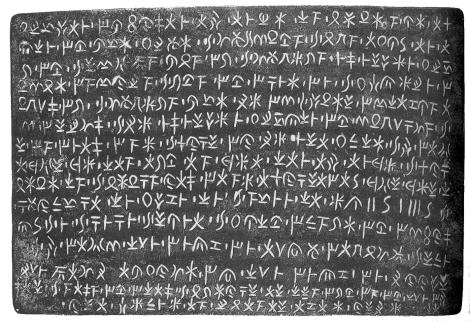As Waziyatawin Angela Wilson explains in American Indian Quarterly, “the process of colonization required the complete subjugation of [indigenous people’s] minds and spirits so that [their] lands and resources could be robbed from underneath [their] bodies” (Wilson 360). One of the most powerful tools that can be used by a colonizer, and that was used by the Canadian government in the Residential Schools program, is the complete devaluation of a group of people’s knowledge and language. This second part is especially effective in terms of many indigenous cultures, as their oral tradition demands the preservation of their language for the survival of their culture. The National Post articles, like the Residential Schools, are relays of this discourse surrounding knowledge that presents indigenous contributions as inferior and outdated.
Perhaps the best example of this comes from Robson’s article. In it, Robson argues against the Truth and Reconciliation Commission’s recommendation that calls for the creation of aboriginal language degrees at post-secondary institutions, claiming that,
Today, a language spoken by a few hundred people is a road to nowhere and a PhD in it like an arrow with a touch screen (Robson 15).
The language chosen here presents a clear juxtaposition of the arrow and the touch screen; an arrow, like the languages of indigenous peoples, is nearly obsolete in modern Western societies, whereas a touch screen is a marker of progress, technology, and the great advancements made by science. They are shown here to be incongruent, and the implication is that one must fade into obscurity. The strong ties between empiricism, science, technology, and Western societies have been identified in earlier posts, but the importance is made even more clear in this context, as such existing discourses are then put to use in arguing against the value of indigenous language, and therefore much of their existing intellectual and literary traditions.
As a result of this narrative, the horrors of the Residential Schools are partially justified by virtue of their attempting to help aboriginal children. As Robson asks earlier in his article, “Yet would any aboriginal activist want young people to be denied the alphabet because ‘the ancestors’ got it from the white man?” (Robson 9). This quote simultaneously ignores existing indigenous traditions of information sharing and reinforces the apparent importance of written language that Western cultures privilege. As Joanne R. DiNova explains, there is an “unstated conclusion that, since Native people have had a written culture for a relatively short period of time, the literature must therefore be primitive, further back on some evolutionary scale” (DiNova 3).

All of this serves to exclude the knowledge and voices of aboriginal Canadians from official, national dialogues. They do not have a claim to science, their language is dying, and this ultimately puts them in a subordinate relationship to Euro-Canadians. Tying into the discussions of progress, rationality, and truth in prior posts on this blog, the valuation of apparent indigenous methods of knowledge gathering compared to Western methods is captured in this quote from Rubenstein and Clifton, in which they state that “by contemporary Western juridical and objective social science standards, however, the report is badly flawed, notably in its indifference to robust evidence gathering, comparative or contextual data, and cause-effect relationships” (Rubenstein & Clifton 7).
Essentially, such statements claim that because others do not play by our rules, they cannot be trusted or listened to with the same respect that you would listen to, for example, a lawyer in a court room. Measuring the contributions of others purely by Western standards is not likely to ever produce a favourable or just assessment, a fact that DiNova illustrates in the introduction of her book when she discusses Western judgments of indigenous literature. She explains that a fundamental connectedness that could be seen in Medieval literature is viewed as primitive by Western culture, and so that same quality provokes the same appraisal when it is identified in aboriginal literature. The problem with such an approach to cross-cultural intellectual interactions is highlighted when she explains that,
Not only is such an approach ‘ethno-critically’ inappropriate, it also misses the full significance of movements in indigenous literature, which have scarcely been revealed (DiNova 14).
To conclude this post, I’d like to recommend that everyone watch this Ted Talk by Wade Davis, which might make you feel a little less pessimistic about the treatment and future of indigenous groups in Canada. At around the 3 minute mark, Davis states that there is no progression of affairs in human experience and that there’s no pyramid that conveniently places Victorian England at the apex and descends down the flanks to the so-called primitives of the world. The video discusses the various forms of indigenous knowledge that are not valued in the same way as ‘western’ scientific and technological advances, such as the naming of the stars in the night sky and their importance in terms of navigation for indigenous Hawaiians. He expands the definitions of science and empiricism to include things like the 2,500 years of Buddhist observations on the nature of the mind. Ultimately this does not attempt to lower the value of Western knowledge, but raise the representation and valuation of other forms of knowledge so that all may be seen as as simply cultural options, eliminating the need for hierarchies or judgments.
Reblogged this on The Expendable Citizen and commented:
A great example of indigenist criticism.
LikeLike
I wish I could like this more! You really hit this one out of the park.
LikeLike
I think you made a vital connection by identifying the relationship between Indigenous literature and the devaluation of their culture. I really enjoyed reading this!
LikeLike
Reblogged this on Robyn Peers and commented:
The following is a featured post from my academic blog, ‘Truth, Reconciliation, and Post-Structuralism,’ which displays my ability to apply critical theory to contemporary media while incorporating a variety of multimedia components.
This post was also featured on the course professor’s blog.
LikeLike